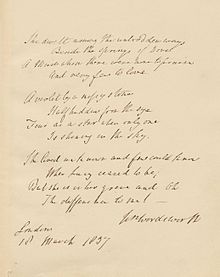
"She Dwelt Among the Untrodden Ways" is a three-stanza poem written by the English Romantic poet William Wordsworth in 1798 when he was 28 years old. The verse was first printed in Lyrical Ballads, 1800, a volume of Wordsworth's and Samuel Taylor Coleridge's poems that marked a climacteric in the English Romantic movement. The poem is the best known of Wordsworth's series of five works which comprise his "Lucy" series, and was a favorite amongst early readers.[1] It was composed both as a meditation on his own feelings of loneliness and loss, and as an ode to the beauty and dignity of an idealized woman who lived unnoticed by all others except by the poet himself. The title line implies Lucy lived unknown and remote, both physically and intellectually. The poet's subject's isolated sensitivity expresses a characteristic aspect of Romantic expectations of the human, and especially of the poet's condition.
According to the literary critic Kenneth Ober, the poem describes the "growth, perfection, and death" of Lucy.[2] Whether Wordsworth has declared his love for her is left ambivalent, and even whether she had been aware of the poet's affection is unsaid. However the poet's feelings remain unrequited, and his final verse reveals that the subject of his affections has died alone. Lucy's "untrodden ways" are symbolic to the poet of both her physical isolation and the unknown details of her mind and life. In the poem, Wordsworth is concerned not so much with his observation of Lucy, but with his experience when reflecting on her death.[3]